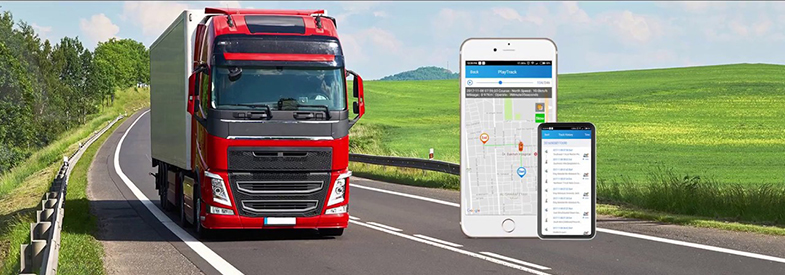As your tablet and smartphone become more reliable and accurate, they’re also giving fleets new systems tailored to solve their specific needs – using the internet to turn vehicles into a sort of virtual motor pool. Make sure you use the right GPS tracking system for your fleet by reading this article!
What are GPS tracking devices?
GPS tracking devices are tracking tiny satellites that transmit signals to a conventional receiver in cars and trucks. Geolocation (latitude and longitude) and time data can be used to map where a vehicle has been and when. This information can be extremely useful in accident investigations, fleet management, security, and asset tracking.
Fleet vehicles can be tracked in real time using GPS tracking devices, which can provide valuable emergency response information. GPS tracking fleet management solutions can help you keep track of the location of fleet vehicles and analyze their movements for abnormal activity. Vehicle tracking can also help protect your assets by monitoring where they are at all times.
Types of GPS Tracking Devices
There are a few different types of GPS tracking devices available for fleet vehicles. The two most common types are stationary and handheld units. Stationary units are typically plugged into the vehicle’s electrical system, and track the vehicle’s location at all times. Handheld units are smaller and designed to be worn by the driver. These units typically have a shorter battery life than stationary units, but they can be more accurate due to their smaller size and lower weight.
The main benefits of using a GPS tracking device for fleet vehicles are safety and efficiency. By tracking the vehicle’s location at all times, fleet managers can ensure that their cars are always where they should be, and that they’re not leaving them unattended in sensitive areas. This is especially important in regards to dangerous routes or areas, where an unauthorized person could easily take control of a car. Additionally, by knowing when a vehicle has stopped for fuel or maintenance, fleet managers can plan their operations more efficiently.
While GPS tracking devices offer many great benefits, they do have some drawbacks as well. One issue is that they can be somewhat expensive to install and maintain, particularly if you need to cover a large number of vehicles. Additionally,
The Benefits of Using a GPS Tracking Device
GPS vehicle tracking devices are invaluable for fleet management. In today’s world, fleet vehicles are constantly on the go. With GPS tracking, managers can keep tabs on the location and movements of their vehicles 24/7.
Fleet managers can use GPS tracking to avoid expensive losses and accidents, as well as to ensure compliance with regulations and safety protocols. The devices also provide vital data for fleet planning, maintenance, and driver training.
Traffic data obtained from a GPS tracking device can help administrators make informed decisions about routes, scheduling and routing. This data can also be used to improve truck utilization and fuel economy.
A GPS tracking device can also be a valuable tool for troubleshooting vehicle issues. By monitoring vehicle location and parameters over time, fleet managers can quickly determine the root cause of any problems. This information can then be used to diagnose and resolve the issue in a timely manner.
Overall, GPS tracking devices are an essential part of modern fleet management. By using these devices, fleets can optimize their operations while reducing costs and enhancing safety.
Why do fleet vehicles need GPS vehicle tracking devices?
As small businesses continue to grow, their fleets of vehicles become increasingly important. This is especially true for companies that operate in demanding environments, such as construction or manufacturing businesses. Equipped with GPS vehicle tracking devices, these businesses can improve safety and efficiency by monitoring the movement of their vehicles. Additionally, this information can help businesses manage logistical challenges and optimize workflow.
A study published by Forbes in 2016 found that GPS vehicle tracking had a host of cost-effective benefits for small businesses. First and foremost, this technology helps businesses avoid the loss or theft of vehicles and equipment. In some cases, it has even helped law enforcement track down criminals. Furthermore, GPS vehicle tracking can improve safety by preventing accidents or jams on work sites. It can also help businesses optimize fleet operations and save on fuel costs.
Overall, GPS vehicle tracking devices are a valuable tool for small businesses. They offer a host of cost-effective benefits that can improve safety and efficiency in the workplace.
Use of GPS Tracking Device in Fleet Management
Fleet vehicles are a necessary part of both business and military life. Whether they are used for transportation, storage, or as part of a defense network, fleet vehicles need to be tracked in order to ensure their safe handling and timely delivery. GPS vehicle tracking devices provide essential data for fleet managers, from monitoring the location and movement of individual vehicles to detecting and preventing accidents.
The benefits of using GPS tracking devices in fleet management are clear. By allowing managers to monitor the whereabouts of their vehicles at all times, they can avoid costly mistakes and ensure that their fleet is operating smoothly. Fleet tracking also provides valuable information about vehicle usage, which can help businesses save money on fuel bills and reduce emissions.
Conclusion
Fleet vehicles are an important part of any organization, and it is essential that they are kept track of at all times. With GPS vehicle tracking devices, employers can keep tabs on the whereabouts of their vehicles both in and out of the workplace. Not only does this help to ensure that the fleet is being used properly and efficiently, but it can also provide insights into how employees are using the vehicles. This information can be used to make improvements where necessary.

